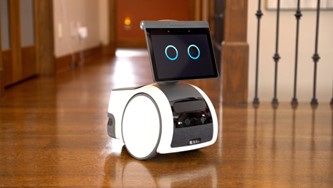 I have a long-standing interest in robotics, going back to my days in grad school (which is far enough in the past at this point to definitely justify use of the term “long-standing”). So, naturally, I was interested in reading about Astro, the new robot from Amazon. It’s not on the market yet, and is available for purchase (for $1,000) by the chosen few by invite-only, and I wasn’t among the invited few.
I have a long-standing interest in robotics, going back to my days in grad school (which is far enough in the past at this point to definitely justify use of the term “long-standing”). So, naturally, I was interested in reading about Astro, the new robot from Amazon. It’s not on the market yet, and is available for purchase (for $1,000) by the chosen few by invite-only, and I wasn’t among the invited few.
Hmmmm. I just looked on Amazon and I may have to walk that back. Looks like you can apply for an invitation and, who knows, I might have been accepted.
Still, $1,000 (correction: $999.99) is a bit steep to pay for a gadget.
And when it comes on the market with a price tag of $1,450, I won’t be lining up to buy one, either. No matter how great my interest in robots is. Especially after reading a couple of reviews.
Amazon describes Astro – was it named after the Jetsons’ dog? –as “the household robot for home monitoring,” which “uses advanced navigation technology to find its way around your home and go where you need it.”
Astro is integrated with Ring Protect Pro – it comes with a 6-month free trial – and you can have Astro “proactively patrol [and] investigate activity.” It’s also integrated with Alexa. You set things up with Alexa – reminders, lists, alerts – and Astro can follow you around playing your playlist, delivering messages. It can also be customized to work with other items, like a blood pressure monitor and a Furbo app that “tosses treats to your pet.”
But it can’t climb stairs or turn a doorknob, so it’s nowhere near as coolly (and scarily) robotic as Spot the robot dog from Boston Dynamics.
Mostly, Astro sounds like it mostly does things that other apps do already. Which is largely the reaction from the reviews I saw.
CNET gives Astro props for being “cutting-edge technology” that’s “built on an innovative piece of hardware.” But counters that by pointing out that it “lacks a compelling use case.”
As a roving Alexa, it can do plenty of things. But you could get the same by having multiple Alexas around. Once it “learns” how to navigate your home (or one floor of it), it can take care of a task like bringing an item from Point A to Point B. But it can’t pick up the item. Someone has to hand it to Astro.
CNET’s bottom line:
In its capacity as an investment by Amazon in the consumer robotics space, Astro is a fascinating device with a whole lot of personality and promise. But as a product you can buy and use in your house right now, it simply lacks the utility or clear identity to make it worth the price.
That and concerns about Astro – which is loaded with cameras – invading everyone in the family’s privacy by buzzing in and out of rooms spying on them, and, despite the security it comes with, being vulnerable to hacking.
TechCrunch saw things in pretty much the same way, in terms of Astro containing some cool technology – they especially liked the periscope camera – and for being adorable and entertaining. They found it “an extraordinarily well-thought-out robot on a technical level.
But not much else:
It’s been fun to have Astro wandering about my apartment for a few days, and most of the time I seemed to use it as a roving boom box that also has Alexa capabilities. That’s cute, and all, but $1,000 would buy Alexa devices for every thinkable surface in my room and leave me with enough cash left over to cover the house in cameras. I simply continue to struggle with why Astro makes sense. But then, that’s true for any product that is trying to carve out a brand-new product category.
For the most part, the Astro Day 1 Edition is an early beta, maybe even an advanced prototype, that’s being used by the Amazon product team to get the feedback that will allow them to figure out the use cases and add the features that will make those use cases possible.
Which is not a bad way to do development. Just not the way we do things around here.
When we build things, and when we collaborate with our clients to help them build their things, there’s always a use case in mind. I can’t think of a single instance in which we or our clients just went out with “if we build it, they will come” in mind, or put something in its initial stages into the hands of end users so they could tell us what to do with it.
Anyway, I will not be applying for an Astro. I have better things to do with $1,000 $999.99. But I will say one thing. If I did get my hands on it, it would be a fun teardown to see what all cameras and sensors are in that cute little gadget without a purpose.
